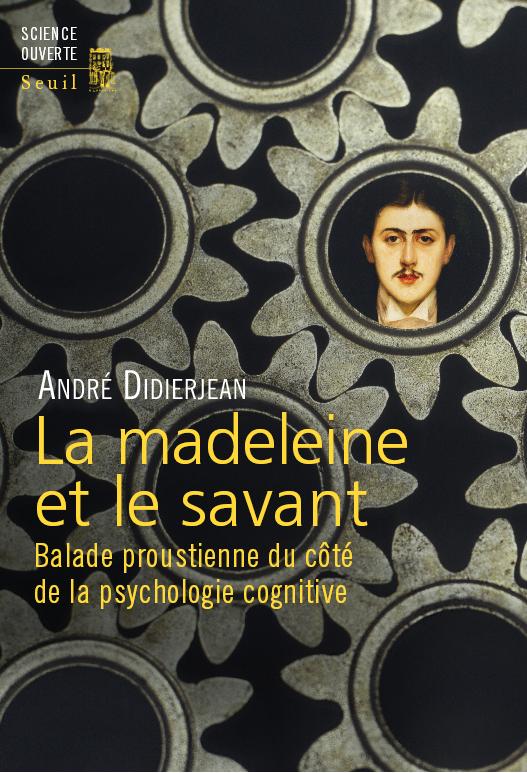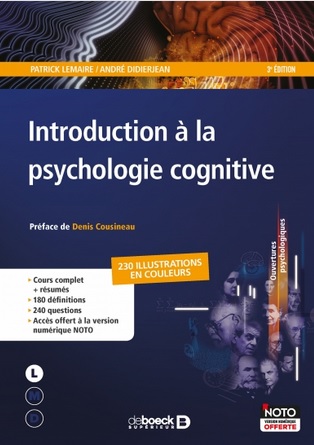
André Didierjean
Professeur de psychologie cognitive
Membre de l'Institut Universitaire de France (membre junior 2011-2016)
Andre..fr
tel +33 (0)3 81 66 51 92
fax +33 (0)3 81 66 54 40
Thèmes de recherche
Psychologie de l’expertise - Perception visuelle - Apprentissage - Attention - Vieillissement cognitif
Publications
Ouvrages
Didierjean, A. (2015). La madeleine et le savant. Editions du Seuil.

Pour en savoir plus sur cet ouvrage :
radio :
Emission "ça va pas la tête" sur France Inter
Chronique littéraire de France musique
Emission "la tête au Carré" sur France Inter
presse écrite :
Les Echos Le Monde
Le Nouvel Obs La Croix
Lemaire, P., & Didierjean, A. (2018). Introduction à la psychologie cognitive. Bruxelles : De Boeck Université.

Diffusion des savoirs
Didierjean, A., & Thomas, C. (2017). Se souvenir… de ce qui ne nous est pas arrivé. Le cercle Psy – Numéro spécial « les 25 grandes expériences de la psychologie » ![]() pdf
pdf
Didierjean, A., & Castel, A. (2016). Même Sherlock Holmes aurait vieilli. Cerveau & Psycho, 77, 84-87.![]() pdf
pdf
Thomas, C., & Didierjean, A. (2016). Des magiciens au laboratoire. Cerveau & Psycho, 73, 20-24.![]() pdf
pdf
Didierjean, A. & Thomas, C. (2015). Toujours un temps d'avance. Cerveau & Psycho, l'essentiel. Février-Avril, 21, 28-33.![]() pdf
pdf
Didierjean, A., Maquestiaux, F., Defrasne, E., & Chauvel, G. (2012). Apprendre sans mots. Cerveau & Psycho, 53, 48-53. ![]() pdf
pdf
Didierjean, A. (2012). L'intelligence de l'expert. Cerveau & Psycho, l'essentiel. Février-Avril, 80-85.![]() pdf
pdf
Maquestiaux, F., & Didierjean, A. (2011). Peut-on penser à deux choses à la fois ? Cerveau & Psycho, 45, 46-50.![]() pdf
pdf
Didierjean, A., Ferrari, V., & Marmèche, E. (2003). La stratégie du joueur d'échecs. Cerveau & Psycho, 1, 58- 61.![]() pdf
pdf
articles
les articles sont téléchargeables ici : https://www.researchgate.net/profile/Andre_Didierjean
Menetrier, E., Didierjean, A., & Barbe-Boudard, V. (in press). Effect of contextual knowledge on spatial layout extrapolation. Attention, Perception, & Psychophysics.
Thomas, C., Didierjean, A., & Kuhn, G. (in press). It is magic! How impossible solutions prevent the discovery of obvious ones? The Quarterly Journal of Experimental Psychology.
Thomas, C., Didierjean, A., & Kuhn, G. (in press). The Flushtration Count Illusion: Attribute substitution tricks our interpretation of a simple visual event sequence. British Journal of Psychology.
Thomas, C., Didierjean, A., Maquestiaux, F., & Goujon, A. (in press). On the Limits of Statistical Learning: Intertrial Contextual Cueing is Confined to Temporally Close Contingencies. Attention, Perception, & Psychophysics.
Menetrier, E., Didierjean, A., & Robin, F. (2017). Effect of expertise on boundary extension in approach sequences. i-Perception, 1-10.
Arexis, M., Maquestiaux, F., Gaspelin, N, Ruthruff, E., & Didierjean, A. (2017). Attentional capture in driving displays. British Journal of Psychology, 108, 259-275.
Chauvel, G., Maquestiaux, F., Gémonet, E., Hartley, A. A., Didierjean, A., Masters, R. S. W., Dieudonné, B., Verny, M., Bier, N., & Joubert, S. (2017). Intact procedural knowledge in patients with Alzheimer’s disease: Evidence from golf putting. Journal of Motor Behavior, 29, 1-7.
Levain, J.P., & Didierjean, A. (2017). Problèmes multiplicatifs, proportionnalité et théorie des champs conceptuels. Revue Rééducation Orthophonique, numéro spécial sur la cognition mathématique, 269, 145-160.
Levain, J.P., Le Borgne, P., Simard, A. & Didierjean, A. (2017). Effet de la mastérisation sur l'expertise des étudiants et professeurs des écoles stagiaires en résolution de problèmes de proportionnalité. Annales de Didactique et de Sciences Cognitives, 22, 9-42.
Thomas, C., & Didierjean, A. (2016). The ball vanishes in the air: Can we blame Representational Momentum? Psychonomic Bulletin & Review, 23, 1810-1817.
Thomas, C., & Didierjean, A. (2016). Magicians fix your mind: How unlikely solutions block obvious ones. Cognition, 154, 169-173.
Thomas, C., Didierjean, A., & Nicolas, S. (2016). Scientific study of magic: Binet's Pioneering approach based on observation and chronophotography. American Journal of Psychology, 129, 315-328.
Thomas, C., & Didierjean, A. (2016). No need for a social cue! A masked magician can also trick the audience in the vanishing ball illusion. Attention, Perception & Psychophysics, 78, 21-29.
Goujon, A., Didierjean, A., & Thorpe, S. (2015). Investigating implicit statistical learning mechanisms through contextual cueing. Trends in Cognitive Science, 19, 524-533.
Thomas, C., Didierjean, A., Maquestiaux, F., & Gygax, P. (2015). Does Magic Offer a Cryptozoology Ground for Psychology? Review of General Psychology, 19, 117-128.
Didierjean, A., Ferrari, V., & Blättler, C. (2014). Role of knowledge in motion extrapolation. The relevance of an approach contrasting experts and novices. The Psychology of Learning and Motivation, 61, 215-235.
Didierjean, A., Maquestiaux, F., Vieillard, S., Ruthruff, E., & Hartley, A. A. (2014). Sexual distractors boost younger and older adults’ visual search RSVP performance. British Journal of Psychology, 105, 162-172.
Harm, J., Vieillard, S., Didierjean, A. (2014). Using Humor as an Extrinsic Source of Emotion Regulation in Young and Older Adults. The Quarterly Journal of Experimental Psychology. DOI: 10.1080/17470218.2013.873474
Goujon, A., Didierjean, A., & Poulet, S. (2014). The emergence of explicit knowlege from implicit learning. Memory & Cognition, 42, 225-236.
Defrasne Ait-Said, E., Maquestiaux, F., & Didierjean, A. (2014). Verbal overshadowing of memories for fencing movements is mediated by expertise. PLoS ONE, 9, e89276. doi:10.1371/journal.pone.0089276
Ménétrier, E., Didierjean, A., (2013). L’expertise en conduite automobile peut-elle moduler le phénomène d’extension des limites ? L’Année Psychologique, 113, 523-545.
Maquestiaux, F., Didierjean, A., Ruthruff, E., Chauvel, G., & Hartley, A. A. (2013). Lost ability to automatize task performance in old age. Psychonomic Bulletin & Review, 20, 1206-1212.
Ménétrier, E., Didierjean, A., & Vieillard, S. (2013). Is Boundary Extension emotionally selective? The Quarterly Journal of Experimental Psychology, 66, 635-641.
Chauvel, G., Maquestiaux, F., Ruthruff, E., Didierjean, A., & Hartley, A. A. (2013). Novice motor performance: Better not verbalize. Psychonomic Bulletin & Review, 20, 177-183.
Blättler, C., Ferrari, V., Didierjean, A., & Marmèche, E. (2013). L'extrapolation du mouvement (Representational Momentum) dans les scènes visuelles dynamiques. L'Année Psychologique, 113, 95-123.
Blättler, C., Ferrari, V., Didierjean, A., & Marmèche, E. (2012). Role of expertise and action in motion extrapolation from real road scenes. Visual Cognition, 20, 988-1001.
Dupays, A., & Didierjean, A. (2012). Impact du mode d’organisation de la tâche en résolution de problèmes sur la réussite et l’apprentissage. Psychologie Française, 57, 1-15.
Vieillard, S., Didierjean, A., & Maquestiaux, F. (2012). Changes in the Perception of Musical Emotions with Advancing Age. Experimental Aging Research, 38, 422-441.
Chauvel, G., Maquestiaux, F., Hartley, A. A., Joubert, S., Didierjean, A., & Masters, R. (2012). Age effects shrink when motor learning is predominantly supported by nondeclarative, automatic memory processes: evidence from golf putting. The Quarterly Journal of Experimental Psychology, 65, 25-38.
Chauvel, G., Maquestiaux, F., Didierjean, A., Joubert, S., Dieudonné, B., et Verny, M. (2011). Mémoire déclarative et mémoire procédurale dans l’apprentissage moteur : comment atténuer les effets du vieillissement. Gériatrie et Psychologie NeuroPsychiatrque du Vieillissement, 9, 455-463.
Menetrier, E., Didierjean, A., & Marmèche, E. (2011). Le système visuel traite-t-il les photographies comme des fenêtres ouvertes sur le monde ? L'Année Psychologique, 111, 753- 773.
Blattler, C., Ferrari, V., Didierjean, A., & Marmèche, E. (2011). Representational Momentum in Aviation. Journal of Experimental Psychology: Human Perception and Performance.
Blättler, C., Ferrari, V., Didierjean, A., Van Eslande, P., & Marmèche, E. (2010). Can expertise modulate representational momentum? Visual Cognition, 18, 1253-1273.
Goujon, A., Didierjean, A., & Marmèche, E. (2009). Semantic contextual cueing and visual attention. Journal of Experimental Psychology: Human Perception and Performance, 35, 50-71.
Didierjean, A., & Gobet, F. (2008). Sherlock Holmes - An Expert's View of Expertise. British Journal of Psychology, 99, 109-125.
Didierjean, A., & Gobet, F. (2008). Can a 150-year-old British detective help modern cognitive psychology? The Psychologist, 21.
Ferrari, V., Didierjean, A., & Marmèche, E. (2008). Effect of expertise acquisition on strategic perception: The example of chess. The Quarterly Journal of Experimental Psychology, 61, 1265-1280.
Didierjean, A. (2007). Parity Effects in an Implicit Learning Task. British Journal of Psychology, 98, 529-545.
Goujon, A., Didierjean, A., & Marmèche, E. (2007). Contextual cueing based on specific and categorical properties of the environment. Visual Cognition, 15, 257-275.
Nogry, S., & Didierjean, A. (2007). Les erreurs commises sur le problème source favorisent-elles le transfert analogique ? Un réexamen de la recherche de Gick et McGarry (1992). Psychologie Française, 52, 341-353.
Ferrari, V., Didierjean, A., & Marmèche, E. (2006). Dynamic perception in chess. The Quarterly Journal of Experimental Psychology, 59, 397-410.
Nogry, S., & Didierjean, A. (2006). Apprendre à partir d'exemples : Interactions entre présentation du materiel, activités des apprenants et processus cognitifs. L'Année Psychologique, 106, 105-128.
Didierjean, A., & Lemaire, P. (2005). Learning rules unconsciously while playing loto: A new task and its application to assess younger and older adults' implicit learning. Current Psychology of Cognition, 23, 249-270.
Didierjean, A., & Marmèche E. (2005). Anticipatory representation of visual basketball scenes by novice and expert players. Visual Cognition, 12, 265-283.
Didierjean, A., & Nogry, S. (2004). Reducing structural-element salience on a source problem produces later success in analogical transfer: What role does source difficulty play? Memory & Cognition, 32, 1053- 1064.
Didierjean, A., Ferrari, V., & Marmèche, E. (2004). L'expertise cognitive au jeu d'échecs : Quoi de neuf depuis de Groot (1946) ? L'Année Psychologique, 104, 771-793.
Didierjean, A. (2003). Is case-based reasoning a source of knowledge generalization ? European Journal of Cognitive Psychology, 15, 435-453.
Didierjean, A. (2001). Apprendre à partir d'exemples: Abstraction de règles et/ou mémoire d'exemplaires ? L'Année Psychologique, 101, 325-348.
Ferrari, V., Didierjean, A., & Marmèche, E. (2001). Problem similarity effects in case-based and schema-based knowledge activation. Current Psychology Letters. Behaviour, Brain & Cognition, 5, 33-48.
Marmèche, E., & Didierjean, A. (2001). Is generalization conservative ? European Journal of Cognitive Psychology, 13, 475-491.
Didierjean, A., Cauzinille-Marmèche, E., & Savina, Y. (1999). Learning from examples: Case-based reasoning in chess for novices. Current Psychology of Cognition, 18, 337-361.
Didierjean, A., & Cauzinille-Marmèche, E. (1998). Reasoning by analogy: Is it schema mediated or case based? European Journal of Educational Psychology, 13, 385-398.
Didierjean, A., & Cauzinille-Marmèche, E. (1997). Eliciting self-explanations improves problem solving: What processes are involved? Current Psychology of Cognition, 16, 325-351.



